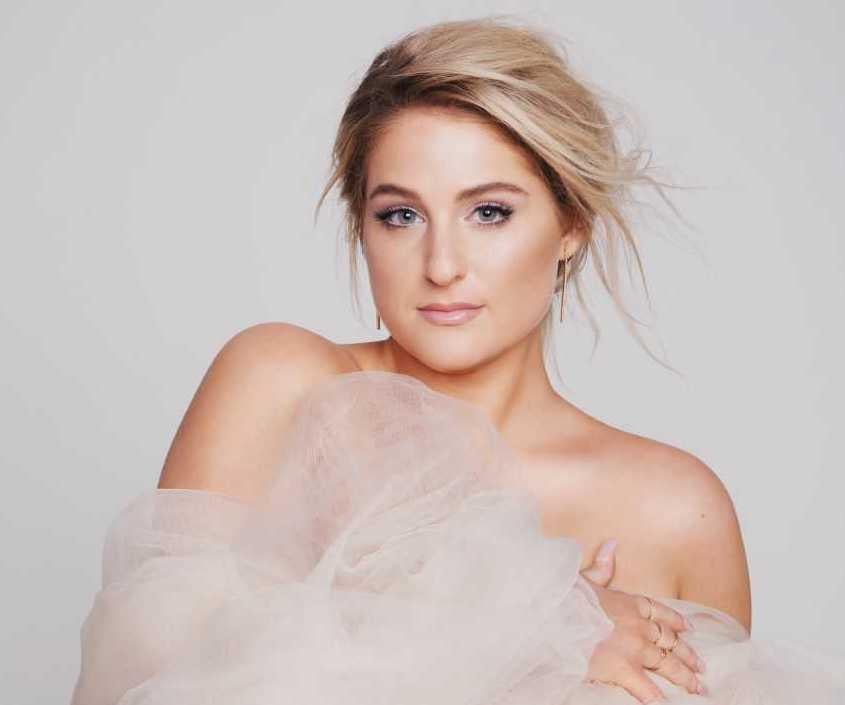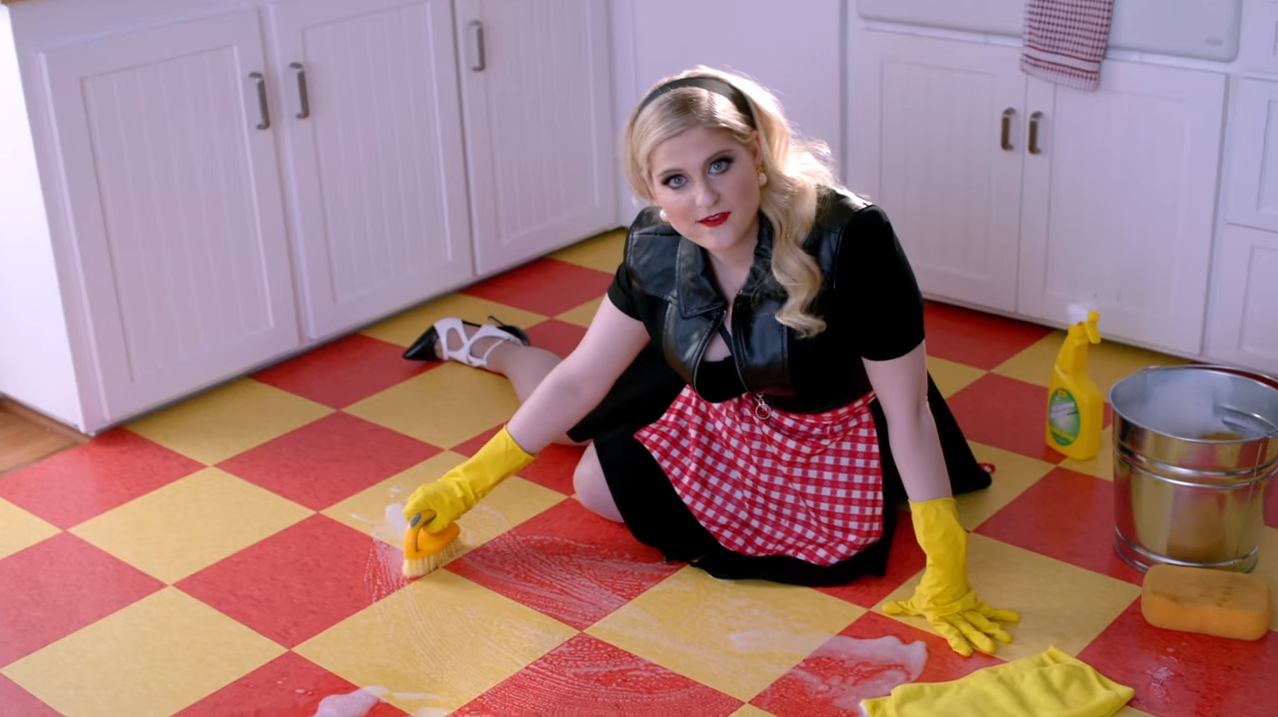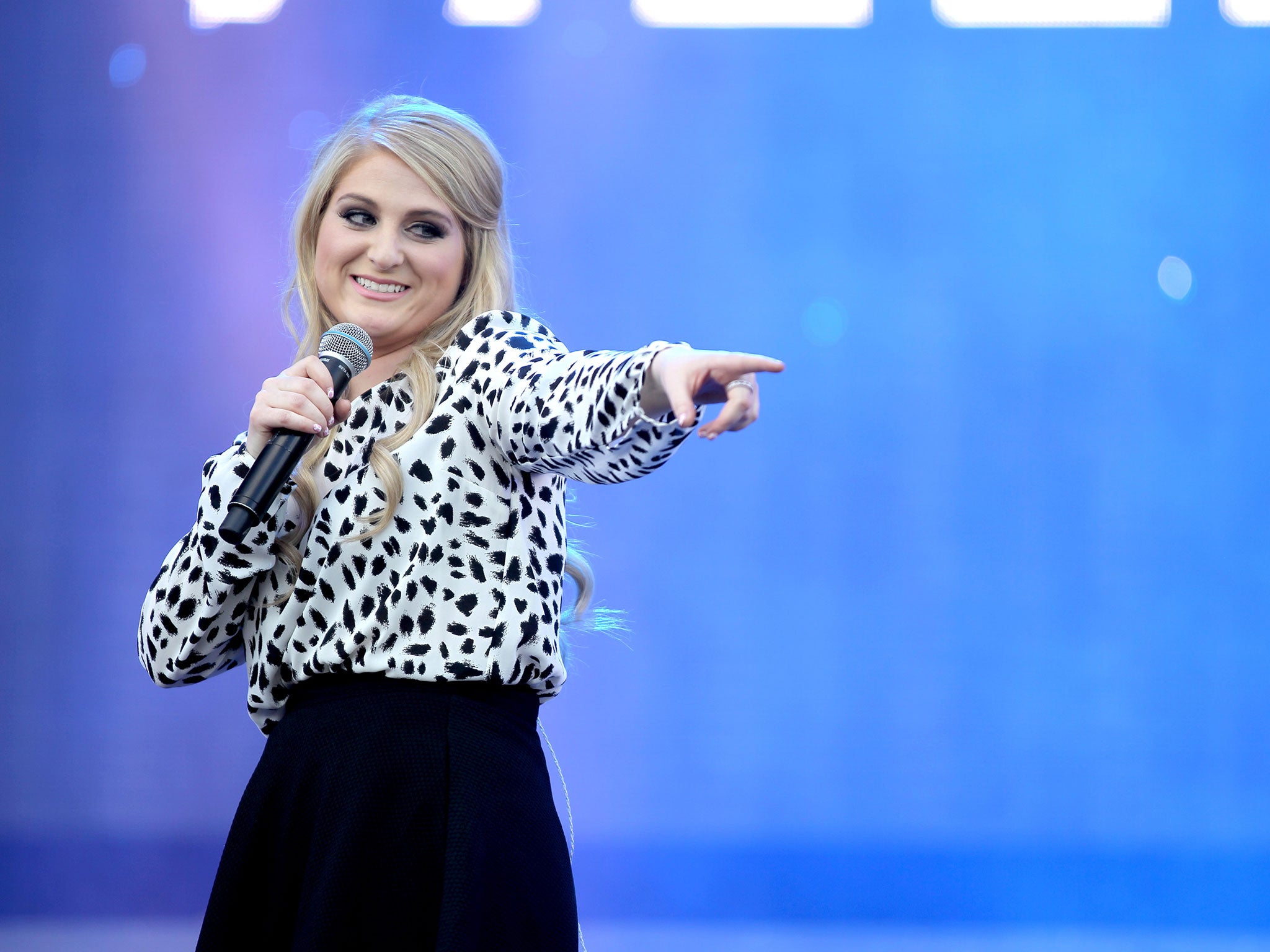Meghan Trainor: ‘I thought of feminists as those people that hate me’
As the pop star behind ‘All About That Bass’ prepares to release her new album, she opens up to Kate Solomon about the repercussions of overnight fame, being a judge on ‘The Voice’, and why she’s changed her view on feminism

Your support helps us to tell the story
From reproductive rights to climate change to Big Tech, The Independent is on the ground when the story is developing. Whether it's investigating the financials of Elon Musk's pro-Trump PAC or producing our latest documentary, 'The A Word', which shines a light on the American women fighting for reproductive rights, we know how important it is to parse out the facts from the messaging.
At such a critical moment in US history, we need reporters on the ground. Your donation allows us to keep sending journalists to speak to both sides of the story.
The Independent is trusted by Americans across the entire political spectrum. And unlike many other quality news outlets, we choose not to lock Americans out of our reporting and analysis with paywalls. We believe quality journalism should be available to everyone, paid for by those who can afford it.
Your support makes all the difference.Before we’re even introduced, Meghan Trainor sweeps me up into a hug. “Sorry,” she says as if it’s she who’s just spent a fraught half hour on the Underground frantically emailing apologies for being late. “I was peeing.” There’s a table full of snacks, a room full of entourage and a dictaphone already between us. In a split second, I’ve constructed a narrative in which the Trainor team is recording the interview in order to dispute anything vaguely interesting, turning the whole thing into a nightmare. It’s not a huge assumption to leap to given the trouble Trainor’s casual, unfiltered interview style has got her into in the past. “Oh wait, is that the last guy’s recorder?” Trainor calls to her PR person. Maybe I’ve been taking this too seriously.
Though semi-supervised by a team that includes her own mother, the 26-year-old American singer-songwriter seems at home on the promo trail. Best known for the 2014 smash hit “All About That Bass”, Trainor at first seemed in danger of being a one-hit wonder. Her albums don’t tend to be works considered worthy of much critical attention, even by the new Pop-with-a-capital-P chin strokers. Her entire team seem surprised that I’ve listened closely to her forthcoming album, Treat Myself, or come to the interview armed with notes. She’s somehow become the kind of celebrity you use as the butt of a joke on Twitter – a byword for a certain kind of superficial pop star, an image of ditsiness. When she sang live on Radio One last week, the reaction was overwhelmingly surprise that she can actually sing. Though she has to defer to her team for almost every name she drops (“What’s her name, from Harry Potter?” “Julia... who was she that lost her voice... Julia Andrews? Mom?”) and our chat is sprinkled with malapropisms, she’s far from stupid. When she talks candidly about the pressures of basically being the CEO of the Meghan Trainor brand, she gets her phone out to show me the two options for where a sticker can go on the CD cover of the new record. She’s not exaggerating when she says she has final sign-off on everything.
While the woman is derided and dismissed, some of her lyrics have been subject to near-academic scrutiny. Trainor first shimmied her way into public consciousness with “All About That Bass”, on the surface a novelty body-positive retro bop that became near-inescapable in the summer of 2014. It was a time when pop culture was just beginning to reckon with the changing state of feminism and the blurring of gender lines. “All About That Bass”, which declared “Yeah it’s pretty clear, I ain’t no size two”, lambasted Photoshopped images and deemed every inch of us all perfect “from the bottom to the top”. It also went on to refer to “skinny bitches” and declare that it doesn’t matter what shape you are because men will want to sleep with you anyway. It was the fourth-best selling single of 2014 worldwide, shifting more than 11 million copies.
Despite the fact that the ubiquitous “Blurred Lines” had dominated the year before – derided more for plagiarising Marvin Gaye than for being, essentially, a date rape anthem – the backlash to “All About That Bass” was swift and occasionally vicious. While much of the mainstream media effectively shrugged and dismissed it as “just a pop song”, websites such as Feministing and Jezebel criticised it not just for the “skinny bitches” comment, but for basing its message of self-acceptance on whether or not men find you attractive. The wave of thinkpieces led to a social media pile-on that culminated in Trainor telling an interviewer that she was not a feminist.
“I was just, like, stupid and young,” she sighs now. Though she looked older, Trainor was 20 when “All About That Bass” came out and she had gone from unknown songwriter to famous pop star almost overnight. “My mom was like, ‘Whatever happens in interviews, if you don’t know what the word is, don’t just say, “I’m this.”’ So I was like, ‘Well, I couldn’t tell you the full definition of feminist.’ And there were a lot of Twitter accounts – feminist accounts – that attacked me hard for ‘All About That Bass’. So in my head, that’s what that word meant, like, ‘Oh, those people that hate me.’ And so I was like, ‘No, I'm not’... And then I got the most attacked ever for that.” It seems to me that there should have been people around her guiding a very young artist through what was clearly a horrible time. Did she get enough support? After the backlash, she says, “they put me in one class of a mediation class – no,” she stops and corrects herself, “media training. Every answer I gave, she was like, ‘No, don’t talk about that!’”
During the course of that year many high-profile women set about reclaiming the word “feminist”. Beyoncé included a definition on her self-titled album and performed in front of the word at the 2014 VMAs, but it wasn’t until she watched Emma Watson’s HeForShe speech at the UN that she fully got it. With her newfound knowledge, did she understand the criticisms levelled at “All About That Bass”, and songs like “Dear Future Husband” that cast her as a submissive, 1950s style housewife? “Yeah, I can hear, like...” she begins, picking at some imaginary sleeve fluff on her Balenciaga fleece and adopts the air of someone being tested. “People were picking apart everything. It showed me that with any success you’ll get picked out, you’ll get ripped apart. When I wrote it, I didn’t know I’d be the artist singing it, and I didn’t know billions of people would hear it over and over again.” That’s not really the point, I try to cut in, but she can’t be stopped. It was just meant to be a fun pop song about all women’s bodies being beautiful. “It’s so ridiculous to think that I’m coming out here being like, I hate skinny people – it’s just, like, so absurd. I really was bummed about it.”

It’s clear that Trainor sometimes speaks first and thinks later, asserting herself but lacking the knowledge or maybe the self-belief to back it up. She lights up when I correctly interpret her words back to her, much more confident in my phrasing than her own. This could be partly down to a bizarre period of her education during which she missed a lot of school. “It sounds so dumb, but I was allergic to the school that I was going to for middle school.” This is classic Trainor in that it was a very serious situation but sounds like a joke. “I got sent home every day for coughing. It was such a dark thing – in hospital they were like, we can give you an inhaler but there’s not much else we can do.” It turned out, eventually, that she was allergic to certain types of mould that were present throughout the old school buildings. Growing up on Nantucket – a tiny island just off the coast of Massachusetts – Trainor wasn’t exactly overwhelmed with alternative school options. At around 14, she and her dad moved to Cape Cod for two years so Trainor could attend a school where she could breathe, while her mum and brothers stayed in Nantucket, where the family business was. “My parents were living like divorced parents, but they’re madly in love. It was very difficult for all of us and I missed a good few years of school. Every time I say something stupid, my brothers are like, ‘Sorry, she didn’t go to school.’” She laughs. “You miss out on a lot.”
This crack of insecurity runs through the veneer of self-empowerment that covers most of her songs. Though she describes Treat Myself as “the usual Meghan Trainor – empowering anthems and love yourself moments”, it features songs where she blames relationship missteps on an evil twin (“Evil Twin”), pushes back against media misconceptions (“Nice to Meet Ya”) and assures us that all this tricky life stuff… well, she’s working on it (“Workin’ On It”). “I’m your biggest fan,” she sings on the Norah Jones-esque ballad “Here to Stay”, following it with the decidedly less enthusiastic, “You like me as I am.”

“It’s tough,” she says. “Everyone’s like, ‘You’re so powerful and believe in yourself and you’re so confident.’ I’m like, ‘What? No, I’m not.’ I’m working on it all the time.” She feels lonely with very few people able to relate to exactly what her life is like. Therapy hasn’t stuck and it’s difficult to talk to friends, she says. “[They]’ll say, ‘I know how you feel.’ You don’t know how I feel because you’re not a pop star. You’re not doing the interviews I’m doing, not sitting in the chair. I want an idol like Kelly Clarkson to talk to me about [it all], but... well, she’s busy, obviously.” You need a pop star WhatsApp support group, I say. She beams. “Dude, my mom’s been saying we need to do like a summer party for like female pop stars and get together and be like, ‘Let’s talk about how we had to figure out the budget for lighting, and how bizarre this s**t is and like, why are we paying for cubes for dancers to stand on at $9,000 apiece!’ But um, yeah. It’s hard to be friends with them, you know?”
Enjoy unlimited access to 100 million ad-free songs and podcasts with Amazon Music
Sign up now for a 4 month free trial (3 months for non-Prime members)
Enjoy unlimited access to 100 million ad-free songs and podcasts with Amazon Music
Sign up now for a 4 month free trial (3 months for non-Prime members)
Offering that level of support to up-and-coming artists is one of the reasons she was desperate to be a judge on the latest series of The Voice UK, giving a heart-felt presentation and roping her four dogs into the process. “I brought them to my home and I gave each person a dog. Like, this is what I am. And it worked!” On the show – as she is in person – Trainor is warm and instantly likeable. Running on stage to hug a crying contestant and liberal with the standing ovations, she’s definitely not from the Simon Cowell school of talent show judging.
Though she’s clearly having a lot of fun on TV, the album has been quite a struggle. In 2017, Trainor had vocal surgery and for a while she thought she might never be able to sing again, a very dark time that left her feeling like half a person. “Writing a song and then singing it... that’s what I live for, you know?” It was also a stressful time to maintain a career. “I’ve had radio people threaten me, like if you don’t do this half hour set we’ll never play Meghan Trainor on our stations again. And you’re, ‘OK, so that’s what it is.’” A combination of lip syncing (“I was absolutely terrified and wanted to cry forever”) and vocal rest got her through it.
But then there was the record itself. Her label sent at least three iterations back, telling her she could do better. At one point it was a reggae record inspired by her Trinidadian uncle, which perhaps we can all be grateful to her label for putting the kibosh on. The final result is a very loud mish-mash of reference points – Ariana Grande meets Pink meets Christina Aguilera via tyre squeals from the weirder end of pop. It is, quite frankly, a lot for your ears to deal with. For a while it was almost all gushing love songs because, in her personal life, Trainor is deliriously happy. She’s head-over-heels for her husband of one year, Daryl Sabara. Thankfully she turned to her brother, whose romantic exploits tended to be more varied. “I was like, ‘What’s your love life like?’ He was like, ‘Terrible.’ I was like, ‘Great.’” Both her brothers were involved in the making of the record, which she sees as a family affair. I love my sisters but if I worked closely with them on anything, I think we’d end up killing each other, I tell her. “They’ll be very honest,” she cackles. “Like, they’ll just say, ‘No, that sucks.’ And I’m like ‘Who has the Grammy here?’”
She won the Grammy in question for best new artist in 2016, but she’s not striving for more, particularly. “I’m not a person that’s like, I need 50 Grammys. I got mine, I’ve done that.” For now, she’s working on selling out arenas, and working on herself. “There are moments where, like yesterday, I cried a couple of times. But then there’s other days where it’s all just so incredible. All my dreams have come true. You’re like, I would never do anything else.” As she finishes speaking, she gets up to say goodbye and – another classic Meghan Trainor moment – immediately falls over. Her foot’s gone to sleep. She laughs, unembarrassed, throwing herself into another hug. Meghan Trainor is fully herself. And she’s not pretending to be anything else.
Treat Myself is out on 31 January
Join our commenting forum
Join thought-provoking conversations, follow other Independent readers and see their replies
Comments